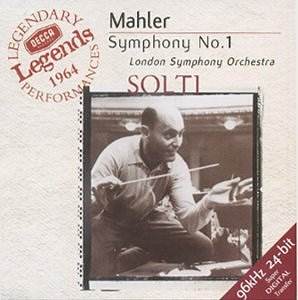Gustav MAHLER
Symphony No.1 in
D
 London Symphony Orchestra/Sir
Georg Solti
London Symphony Orchestra/Sir
Georg Solti
 DECCA LEGENDS 4586222
[53.51]
DECCA LEGENDS 4586222
[53.51]
Crotchet AmazonUK
AmazonUS

There was a time when this recording was praised to the heights, but that
was when Mahler recordings were thinner on the ground. I wouldn't argue that
it deserves its legendary status, though. When it first appeared on LP in
the early 1960s it represented one of the first modern era stereo Mahler
recordings to appear following the start of the Mahler "boom". It was therefore
on most Mahlerites' shelves. In terms of recorded sound and playing it was
a major step forward over what had gone before and in that sense was hugely
influential. I've always believed it is to be preferred to Solti's second
recording of the work made in Chicago in the 1980s; not that I rate Solti's
readings of Mahler highly, I have to add. It's just that those aspects of
his general approach to this particular work and to Mahler in general that
I take issue with seem more accentuated in the Chicago remake.
There is a real sense of foreboding in the introduction to the first movement
but the weight it seems to carry is surely too heavy and, as the cellos climb
up the scale to meet the exposition proper, there's a robust character to
the music that I think is misplaced. The development section carries on this
feeling of one-dimensional clarity and when the brass bursts out at the great
climax into the recapitulation there is a sharp edge to the sound that will
be the keynote of this recording. The second movement Scherzo is very fast
with absolutely no relaxation in the trio so I don't feel the movement makes
any real impression.
The solo double bass is superb at the start of the third movement (Stuart
Knussen, perhaps) and Solti is certainly aware that this is very particular
music needing extra special treatment. Even so I felt the first interjection
of the cafe band music too ordered and drilled to make the kind of effect
Mahler intended and which is to be found in other versions. The Wayfarer
song quotation certainly doesn't have the sweet repose of Kubelik (DG) or
Walter (Sony) and, like so much else in this recording, we are given just
what lies on the surface and no more. There are some good "oom-pahs" in the
closing section but, on balance, I sensed more of a Wagnerian approach coming
through and Solti's particular kind of Wagner at that.
The virtuoso brass playing of the LSO in the fourth movement opening is sharp
and edgy, reminding us how brass-dominated Solti's view often is. He also
indulges the transition from the opening material and the lyrical second
theme which he then moulds and shapes in a very calculated manner indeed.
It's all very heavy-handed. The sharp brass playing is in evidence again
in the central "false" climax and the overall impression is of something
"full of sound and fury, signifying nothing" which is also how the climax
to the nostalgic recall before the coda strikes me too.
At this time the LSO were a formidable instrument. They had learned their
Mahler with Jascha Horenstein and Solti's preference for them over the Vienna
Philharmonic was more than justified. Decca's ace producer John Culshaw was
in charge of the Kingsway Hall sessions but his loathing of Mahler's music
(in his memoirs he said it made him feel physically sick) meant this was
the only Mahler he would record with Solti.
A famous recording newly restored, but one that now leaves much unsaid.
Tony Duggan

